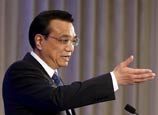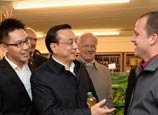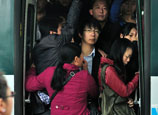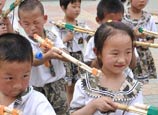
 |
| Nastru Sani (right) and Abdullahi Kassim, both from Nigeria, dub a Chinese TV drama in Beijing. Zou Hong / China Daily |
"When we walk on the street and see a poster for the TV series, we can recall the names of the characters, such as Mao Doudou, the daughter-in-law. The series is really popular," the 29-year-old Tanzanian TV presenter said.
He never imagined that a year later he would be dubbing for a Chinese TV series, Jin's Happy Life, portraying the father of newly married Xiao Mi. He has to deal with her troubled family relationships.
Ahmed said: "I studied Chinese at college, which helped me win the job. Though I had never done dubbing before, I enjoy the TV series and can easily get myself into the character. It's crossing the cultural divide.
"You've got to create characters you wouldn't be able to create in any other medium. It's a new and exciting experience for me."
With 29 other voice actors from Africa, Ahmed is in Beijing busy dubbing for 10 Chinese TV series and 52 Chinese movies in a project managed by China Radio International.
Wang Gangjian, director of the Film and Television Dubbing Center at the radio station, said the center is in charge of the project, from translating to dubbing and post-producing the TV series and movies.
Two years ago, when Wang visited Tanzania, where Swahili is widely spoken, the cultural counselor at the Chinese embassy invited Wang to recommend a Chinese TV series to be dubbed in Swahili.
The initial plan was to dub and broadcast Ke Wang, or Yearning, which was widely popular in China in 1991.
"Ke Wang reflects ordinary Chinese people's lives more than 20 years ago, which were totally different from today's lives. So we decided to do another TV series, close to Chinese people today," Wang said. "That was when Mao Doudou and Her Sweet Days was sweeping China."
Thanks to the success of the series in Africa, more Chinese TV series and movies will be dubbed in English, French, Arabic, Portuguese, Swahili and Hausa, for broadcast in Africa in the latter half of this year.
"With Chinese TV series being exported to other countries, international audiences will be able to understand more about China," Wang said.
Wang added that all the TV dramas being dubbed have been well received in China. They comprise mainly light-hearted comedies portraying modern Chinese people's family lives.
For example, Go Lala Go features a hard-working career woman and her relationship, while Jin's Happy Life tells everyday stories about ordinary Chinese people.
TV: Shows help Africans understand today's China better
"The funny and interesting plots lead overseas audiences to look into Chinese people's everyday lives," Wang said. "If the TV series are aired only with English subtitles, they won't touch the hearts of audiences as much as when they are dubbed in local languages."
Mohamedi Omari Kaboba, an artist from Tanzania, who has performed in dramas and also dubbed advertisements, applied for the dubbing job because he enjoys watching Mao Doudou and Her Sweet Days.
"Family relationships are a mutual issue for people anywhere in the world. For us, it also helps us better understand today's China," he said.
Nastru Sani, from Nigeria, has also been chosen to join the dubbing project. The 34-year-old lends his voice to the role of Wu Di, one of the leading parts in the TV drama Beijing Love Story, which revolves around three pairs of lovers.
"I watched many Chinese kung fu movies before I came to China. I thought Chinese people were all kung fu performers. But when I watched the TV series, I saw a different China, and young people's love stories are just like mine," he said.
Sani said he portrays an emotional Wu Di, whose heart is broken by a girl. "My own girlfriend went away with a rich guy, like Wu Di's girlfriend, so I can feel the same sadness," he said.
Though all the voice actors from Africa have experience in the TV, theater and movie industries, most have never dubbed for TV series and movies before.
Wang Xiaoyan, who trains these African voice actors, said, "We helped them understand their characters." She dubbed the voice of Ikkyu san in the Japanese animation Smart Ikkyu-san, broadcast in China from 1983 to 1988.
One of the most challenging aspects for the African voice actors is that they have to match the lines said by the Chinese characters and to find the right emotions.
Wang said, "Before the formal dubbing, we practiced word by word. We have translators to adjust the lines on site, and the voice actors also help find the most accurate words and emotions to express the characters."
















 Couple say 'I do' after 35-year wait
Couple say 'I do' after 35-year wait


![]()
